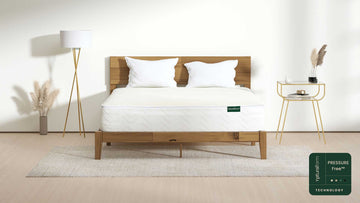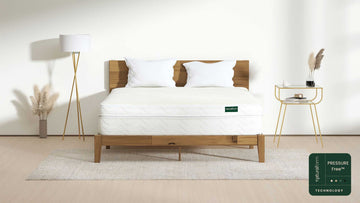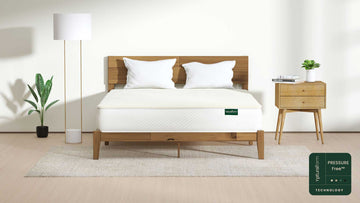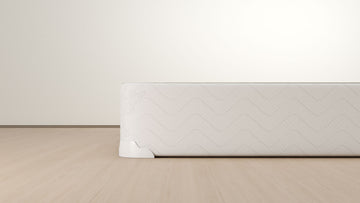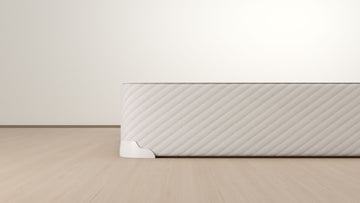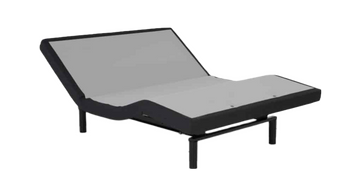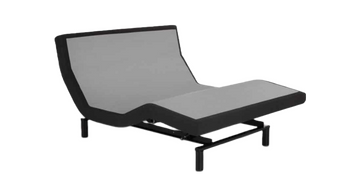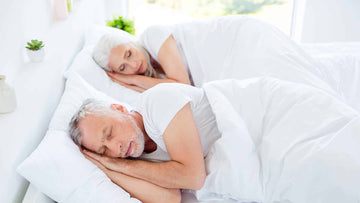What's the best bed for elderly people?
The Golden years, the autumn of life, your second childhood—or however you put it—sounds picturesque and tranquil. Playtime with grandchildren, free of worries from work, a good hand during Bridge (hopefully), and mornings spent on the front nine—you’d think this all adds up to blissful days and sound-sleep nights. But ask any senior, or person over 65, and they may have a hefty list of complaints when it comes to sleep.
Even though retirement may make reaching a healthy life-balance less stressful, there are some other stressors that do come with age, including getting a good night’s sleep. Difficulty falling asleep, trouble staying asleep, and sleep disturbances are among the norm when it comes to seniors.
The movies and media portray less sleep or poor sleep as normalized, so when sleep difficulties occur during the older years, it is automatically assumed as inevitable and unfixable. Although body changes and alterations of the body’s natural sleep architecture is normal, sleep deprivation is not. Many adults reluctantly function on less sleep, but it is not necessarily healthy for them just because their older.
The golden years is a time when your mattress is your best friend, or worst enemy. It is essential to invest in a great model that provides support and comfort as you age, especially if you have any health issues. But you’re in luck, there are tons of options out there with products suitable to your meet your needs.
Soothing troubled sleep
According to recent studies, insomnia is extremely common among seniors. Whether it is due to health issues, side effects from prescription medicines, or anxiety surrounding aging, the causes of insomnia vary.
Neurologist certified in sleep medicine, Jack Gardner, MD, discusses how debilitating sleep deprivation can be, “Insomnia is more common for seniors, partly because of health issues, partly because of the anxiety and the concerns of aging, and sometimes because of medication.” Gardner also mentions that pain from arthritis and frequent urination are more common, too, and strip away sleep from seniors.
Seniors are more susceptible to certain sleep disorders, including temporary loss of breath, sleep apnea, and restless legs syndrome.
Other conditions can also exacerbate the inability to get a good night’s sleep, such as:
- Arthritis
- Fibromyalgia
- Hip Bursitis
- Spinal Stenosis
- Chronic Back Pain
- Diabetes
- Alzheimer’s disease and other forms of dementia
- Parkinson’s Disease
- Heart Failure
- Kidney Disease
- Vitamin D deficiency
- Delayed sleep syndrome
Early to bed, early to rise
“Sleep Architecture,” or sleeping patterns, changes with age. Common changes among seniors is a “lighter” sleep with more recurrent waking up in the night. Sleep architecture changes are often normal, but you should be on the lookout for abnormal changes as well.
Commonly reported sleep architecture changes include:
- Desire to wake up earlier and go to bed earlier
- Spending more time in bed to achieve a full night of sleep because it takes longer to fall asleep and waking up disrupts sleep
- Longer duration spent in bed in attempt to achieve a full not of sleep because it difficult to fall asleep and waking up disrupts sleep
- The amount of time asleep
- Abrupt change between sleeping and waking up
- Heightened awareness of being away
- Memory loss
The National Institute of Health reports that the connection between sleep and memory may explain why seniors are often forgetful. The sleep pattern changes result in less slow-wave activity, which is critical for memory performance. The brain thus deteriorates with age, making it more difficult for the brain to store memories during nighttime sleep.
Whatever the cause may be keeping you up at night, bottom line: it’s important to uncover the root of the issue. Gardner advises, “See your doctor if you’re not getting restful sleep at night and are unable to wake up refreshed….Healthy sleep is something one should expect at all ages.”
Lifespan of a mattress
It’s extremely important to also consider the lifespan of that mattress you may be sleeping on. Good sleep is not a luxury. It is a necessity. Prioritize the most important furniture in your house, and your mattress should be at the top.
How do you know if you need new mattress? You already have the answer, just ask your body. Do you wake up sore and stiff? Is your back pain worse in the morning than the evenings? Is your mattress more than a decade old, or do you not even remember when you last bought a new one? If you answered “yes,” to any of the above, it would be an excellent investment to consider a new mattress.
The Best Bed for Seniors
All in all, broken sleep is not “normal” after 65. As age creeps up, it is obligatory to take a proactive approach in order to receive placid sleep. Sleep should never be compromised, and Natural Form won’t allow it.
Natural Form is featured in top-ranked hospitals around the globe, indicating that is is found clinically satisfiable to provide sensational support to all body types and ailments.
Why do hospitals love it? The innovative technology inside provides precise pressure-point alleviation, properly displacing your body to reduce aches and pains and keep you asleep.
The memory foam inside is CertiPUR certified, and comes in a range of heights and firmness options for your needs. On top of that, the foam features Australian Gold Certified wool, a flawless body temperature regulator to keep you soothed and sound asleep.
Last but not least, the mattress firmness is adjustable so it can be customized to you and your partner. It allows you to change the firmness based on your ailments and gradual sleep architecture changes. Natural form will take the science out of finding a new mattress, and ensure a healthy sleep so you can wake up feeling like yourself. Natural form will ensure you to have a healthy sleep that harvests all of those important memories within the golden years.
